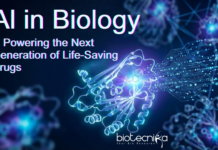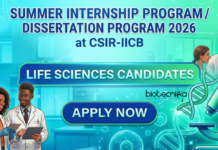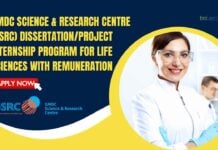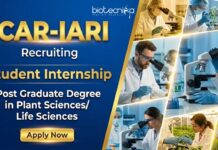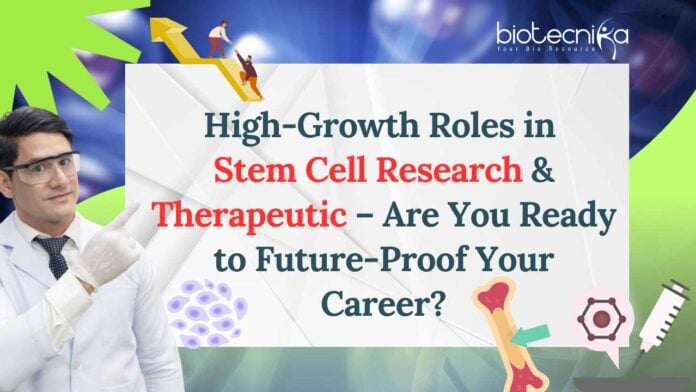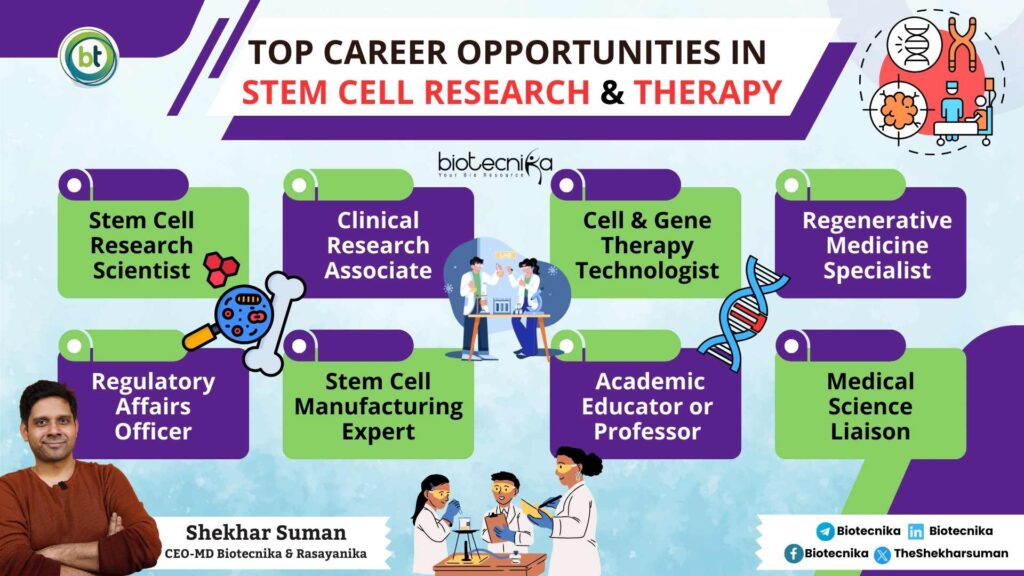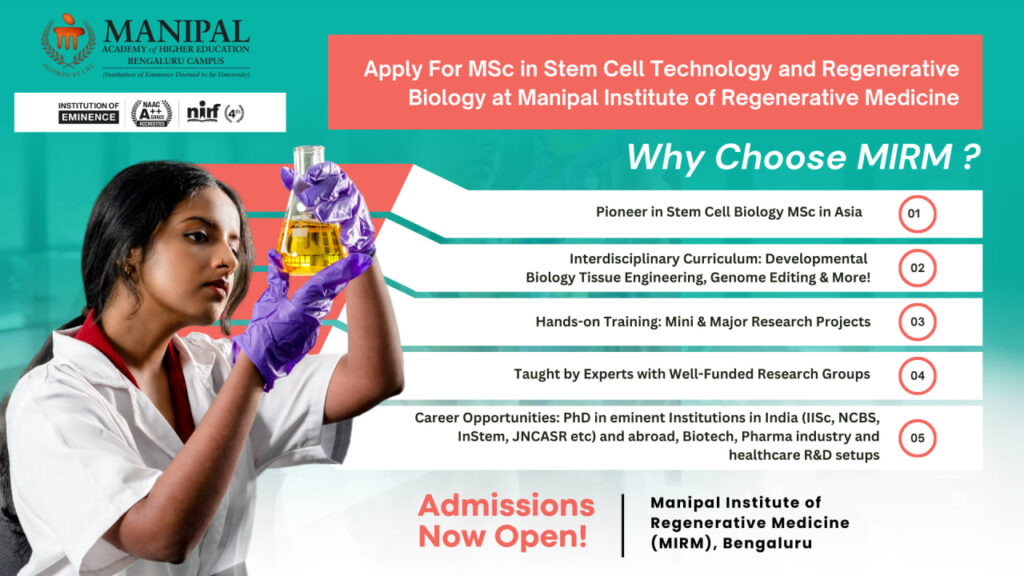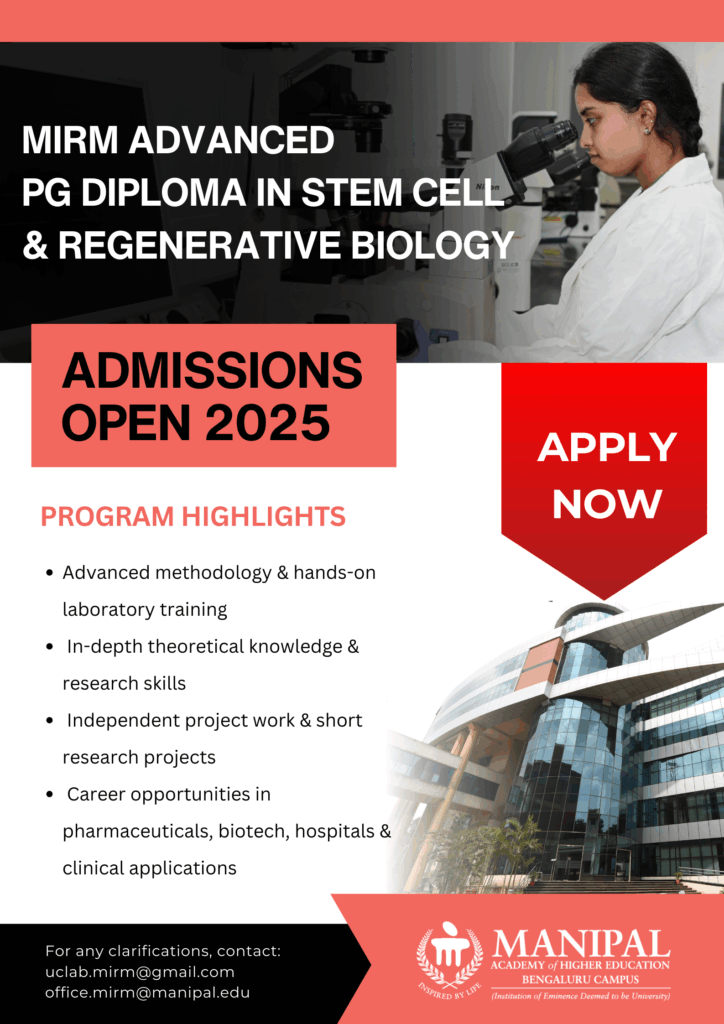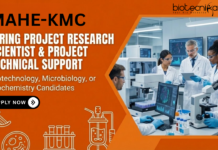Table of Contents
Stem Cell Research & Therapy Careers & Opportunities
Prepare to amaze yourself! Stem cell research and therapy are transforming healing in incredible ways. This growing field is changing how we view disease treatment and the healing of the human body.
It unveils a plethora of exciting and meaningful career paths. This article looks at new career options in stem cell research and therapy. We will cover the skills needed and how students can get ready for this exciting field.
What is Stem Cell Research?
Stem cell research looks at undifferentiated cells. These are cells without specific functions. Later, they can turn into different types of cells in the body. These cells can divide and grow into tissues. This makes them great for treating and repairing damaged organs and chronic diseases.
Types of Stem Cells
- Embryonic Stem Cells – Procured from embryos, these primordial cells can differentiate into any cell type.
- Adult Stem Cells – These are found in adult tissues like bone marrow and are used in replacement therapies.
- Induced Pluripotent Stem Cells (iPSCs) – These are reprogrammed adult cells tweeked to behave like embryonic stem cells.
Why is Stem Cell treatment Important?
Stem cell therapy emerges as a beacon of hope, illuminating various innovative pathways to treat diseases that were once considered incurable. These include:
- Parkinson’s disease
- Diabetes
- Alzheimer’s disease
- Certain types of cancer
- Spinal cord injuries
As these therapies’ frontiers expand, so do the job opportunities linked to their advancement.
Top Career Opportunities in Stem Cell Research & Therapy
Here are some of the most promising job roles in the stem cell research and therapy as a transformative sector:
- Stem Cell Research Scientist
- Role: These intellectual scientists conduct experiments that reveal the behavior of stem cells and simultaneously test the efficacy of the new test therapies.
- Qualification: PhD in biotechnology, molecular biology, or related fields.
- Where You Work: Universities, cutting-edge research labs, and pharmaceutical companies.
- Clinical Research Associate (CRA)
- Role: These vigilant scientists meticulously monitor clinical trials, ensuring the integrity of the trials involving stem cell treatments.
- Qualification: Bachelor’s or Master’s in life sciences, augmented by certifications.
- Skills: Good documentation skills, profound understanding of regulatory mandates.
- Cell and Gene Therapy Technologist
- Role: These technologists prepare stem cells for patient therapy in sterile clinical labs.
- Qualification: Bachelor’s in biotechnology, lab technician training.
- Environment: The controlled environments of hospitals and GMP (Good Manufacturing Practice) certified labs.
- Regenerative Medicine Specialist
- Role: They collaborate with physicians and fellow doctors to research and develop tissues or organs using regeneration techniques.
- Background: Medical degree or research experience in cell biology.
- Scope: Their expertise is in high demand in both hospitals and startups.
- Regulatory Affairs Officer
- Role: They are guardians of the ethical and legal standards, ensuring that all stem cell-based products adhere to legal and ethical guidelines.
- Qualification: Life sciences degree + regulatory certifications.
- Importance: Required to secure product approval and vouching for safety checks.
- Stem Cell Manufacturing Expert
- Role: These engineering minds design and carefully maintain stem cell production pipelines required for the scalable production of stem cells.
- Qualification: Degree in biotech/bioprocessing + industry experience.
- Workplace: Biotech firms and advanced manufacturing units.
- Academic Educator or Professor
- Role: They impart the fundamental principles of stem cell biology and monitor the next generations of scientific explorers through supervised student research.
- Qualification: PhD + postdoctoral experience.
- Contribution: Shapes the next generation of scientists.
- Medical Science Liaison (MSL)
- Role: Acts as a bridge between pharma companies and clinicians.
- Skills Needed: Communication, research, and strong scientific knowledge
The Global Outlook: A Booming Industry
Recent studies show that the global market for stem cell therapy is set for rapid growth. Several market research studies predict that by 2030, it will surpass USD 25 billion. We need experts in stem cell biology, clinical applications, and translational medicine. This need is increasing at a fast pace.
Stem cell research is booming in countries like the U.S., Japan, Germany, and India. Private biotech firms, research labs, and academic organizations are hiring qualified applicants.
Applications of Stem Cell Research in Drug Discovery and Disease Modeling
One of the most transformative applications of stem cell research lies in drug discovery and disease modeling. Using induced pluripotent stem cells (iPSCs), scientists can now create patient-specific cell lines that mimic real disease conditions in the lab. This allows pharmaceutical companies to:
- Screen new drug compounds more accurately
- Predict toxicity and side effects earlier in the development process
- Understand disease progression at the cellular level
Such models have drastically reduced the time and cost associated with traditional drug development pipelines. With stem-cell-based platforms becoming the new gold standard, researchers with expertise in this domain are highly sought after in pharma R&D divisions.
Competencies Required for Success
Candidates should concentrate on the following abilities to succeed in the field of stem cell research and therapy:
- Solid background in genetics, molecular methods, and cell biology.
- Familiarity with safety procedures and lab equipment.
- Proficiency with microscopes and cell cultures.
- Knowledge of the legal, ethical, and regulatory systems.
- Critical thinking, communication, and teamwork.
To excel in the field of stem cell research and therapy, candidates should focus on the following skills:
- Strong foundation in cell biology, genetics, and molecular techniques.
- Knowledge of laboratory equipment and safety protocols.
- Experience in handling cell cultures and microscopy.
- Awareness of ethical, legal, and regulatory frameworks.
- Teamwork, communication, and critical thinking.
How to Prepare for a Career in Stem Cell Science
- Choose the Right Educational Path
Start with a degree in biotechnology, life sciences, or biomedical engineering. Follow it up with a specialized Master’s or PhD in stem cell biology or regenerative medicine.
One of the most reputable institutions in this space is the Manipal Institute of Regenerative Medicine (MIRM).
The Manipal Institute of Regenerative Medicine (MIRM) is among the most respected organizations in this field. MIRM has a well-known cutting-edge infrastructure facility, a globally aligned curriculum, and an emphasis on translational research, providing postgraduate programs that offer comprehensive instruction in regenerative biology and stem cell technology.
MIRM gives you the resources, guidance, and practical experience you need to succeed in this quickly evolving field, whether your career goals are a research-intensive career or a position in the clinical or biotech sector.
These are the courses provided by MIRM:
The MSc degree in Stem Cell Technology and Regenerative Biology by MIRM
This Master’s program is designed to provide in-depth knowledge and advanced skills in stem cell research and regenerative biology. Its strong focus on theoretical concepts and laboratory practices prepares students for careers in research, academia, and industry.
Duration: 2 years (4 semesters)
What the Course Offers
- Classroom teaching and practical training across four structured semesters
- Guest lectures by national and international experts
- Hands-on workshops in advanced stem cell techniques
- Exposure to diverse laboratory environments
- A six-month Mini Project (3rd semester) and a six-month Major Project (4th semester) under dedicated faculty mentorship
Advanced PG Diploma in Stem Cell and Regenerative Biology by MIRM.
This program offers a comprehensive blend of theoretical understanding and hands-on training in stem cell and regenerative biology. It is designed for students aiming to develop practical research skills and explore clinical applications of stem cells.
Duration: 1 year (Annual system)
What the course offers:
- Core knowledge in basic and advanced stem cell biology
- Training in laboratory techniques and cell culture methods
- Exposure to the clinical and therapeutic applications of stem cells
- Research methodology, data analysis, and scientific writing
- Independent short-term research projects
It also serves as a bridge course, which can help medical professionals, BDS, MBBS, and paramedical students to gain practical experience in stem cell technologies. With modules tailored to industry standards, it functions as both a skill-building initiative and a career-launching platform.
- Gain Hands-On Experience
Look for internships or training programs in stem cell labs. Many universities and biotech companies offer summer research opportunities.
- Stay Updated with Research
Subscribe to journals, attend webinars, and follow current trends. Continuous learning is key in this fast-moving field.
Future Trends in Stem Cell Research & Therapy Careers
Emerging trends are reshaping the job landscape. Some future directions include:
- Artificial Intelligence in Cell Therapy – AI is being used to track cell behaviour and predict outcomes.
- 3D Bioprinting with Stem Cells – New jobs are being created in tissue engineering and organ printing.
- Personalized Stem Cell Therapy – Creating patient-specific treatments using their cells.
- Stem Cell Banking – Career roles in managing and analyzing stem cell storage facilities.
Career Pathways in Stem Cell Research and Therapy
The field offers diverse roles, each requiring a different set of skills and educational backgrounds.
-
Stem Cell Biologist
These professionals study how stem cells function, how they differentiate, and how they can be directed for therapeutic uses. They work in research labs, academic institutions, or biotech companies.
Skills Required:
- Molecular biology
- Cell culture techniques
- Microscopy
- Flow cytometry
-
Clinical Research Associate (CRA)
CRAs manage clinical trials involving stem cell-based therapies. They ensure regulatory compliance, monitor patient safety, and oversee trial protocols.
Skills Required:
- Clinical trial management
- Ethics and regulatory guidelines
- Patient data analysis
-
Regenerative Medicine Specialist
This role focuses on applying stem cell therapy to heal or replace damaged tissues and organs. Specialists often work in clinical settings or translational research centres.
Skills Required:
- Medical or biomedical background
- Understanding of disease pathology
- Cell transplantation methods
-
GMP and Manufacturing Expert
With more stem cell-based therapies reaching clinical trials, there’s a high demand for professionals skilled in Good Manufacturing Practices (GMP). They work to ensure the safe and scalable production of cell products.
Skills Required:
- Quality control
- Bioprocess engineering
- Regulatory documentation
-
Academic and Teaching Roles
PhDs and postdocs can contribute to the academic world by teaching and leading research initiatives in universities and research centres.
Rising Demand in Pharmaceutical and Biotech Industries
As stem cell technologies gain clinical validation, pharmaceutical and biotech companies invest heavily in regenerative medicine solutions. The industry is seeking skilled professionals who can work at the intersection of cell biology, bioinformatics, and pharmacology.
Master’s in Stem Cell Biology or equivalent qualifications are now viewed as strategic assets by employers in: Drug development companies, Cell therapy startups, Contract research organizations (CROs), and Regenerative medicine manufacturing units.
These roles extend beyond research and include quality control, compliance, clinical coordination, and technology transfer.
For students with a Master’s background in life sciences or biotechnology, the door is wide open to making a direct impact on the pharmaceutical industry’s next wave of innovation.
Advanced Stem Cell & Regenerative Medicine Online Internship
This internship-style course is ideal for students and early-career professionals who want to explore how stem cells are used in translational medicine and therapy.
Highlights:
- Exposure to clinical-grade applications
- Overview of GMP in cell processing
- Disease modeling using iPSCs
- Ethical and regulatory considerations
The field of stem cell research and therapy is changing quickly. The need for such individuals will only grow as healthcare shifts toward more individualized and regenerative treatments.
Now is the ideal moment to make the change, whether you’re a professional wishing to change careers or a student seeking to specialize, this is the golden opportunity.
You can put your career on a transformational course in MIRM by enrolling in the specialized programs mentioned above.
As we know, an MSc in Stem Cell Technology & Regenerative Biology equips students with comprehensive knowledge, advanced technical skills, and critical thinking. All these are necessary to drive groundbreaking innovations, which will be an added advantage. It bridges the gap between the lab bench, the clinic, and the boardroom, empowering graduates to contribute meaningfully across research, clinical applications, and biotech entrepreneurship.
When pursued at a premier institution like the Manipal Institute of Regenerative Medicine, this program becomes more than an academic journey—it becomes a transformative experience, fostering leadership, creativity, and a vision for shaping the future of medicine. If you have the necessary abilities, attitude, and guidance, you could contribute to the future of regenerative medicine.


